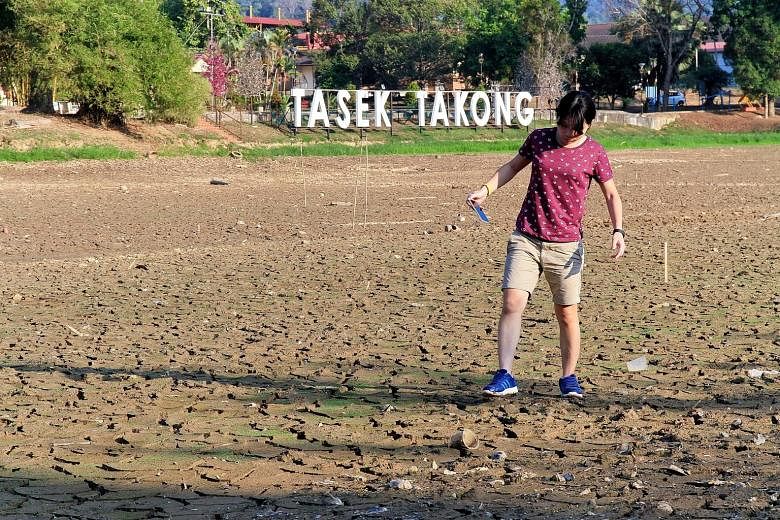PETALING JAYA • Malaysians in several states are being hit by water rationing as a prolonged dry spell shows no signs of abating, with dams and lakes around the country drying up.
The worst hit will be 85,000 domestic and industrial consumers in parts of Johor when rationing starts tomorrow.
In northern Perlis state, rationing for about 13,000 people started yesterday, with water tankers sent out to the villages affected.
Perlis' Timah Tasoh Dam last week had cows grazing on the freshly-sprouted grass around the edges of the dam.
The National Water Services Commission (Span) has raised the alarm, warning that not enough is being done to conserve water in the country of 30 million people.
-
Hottest March on record
-
LONDON • The hot weather in March broke a century- long record for global temperatures and by the greatest margin yet seen for any month, according to The Guardian.
The global weather for February was far above the long-term average, driven largely by climate change, and was described by scientists as a "shocker". They also said it signalled "a kind of climate emergency".
But the newspaper in a report on Friday said that data released by the Japan Meteorological Agency (JMA) has showed that March was even hotter.
Compared with the average temperature for the 20th century, March hit 1.07 deg C higher across the globe, according to the JMA figures. The measurements go back to 1891.
A related piece of bad news shown by the Japanese data: Every one of the past 11 months has been the hottest ever recorded for that month.
A major El Nino weather event, the biggest since 1998, is spiking temperatures around the world, the British daily said. Scientists agreed that global warming driven by humanity's greenhouse gas emissions is the largest factor in the run up of temperature records.
Data released last Friday by the United States National Aeronautics and Space Administration (Nasa) has confirmed that last month was the hottest March on record, The Guardian said. But the US agency's data indicated February had seen the biggest margin.
The Nasa data recorded March as 1.65 deg C above the average from 1951- 1980, while February was 1.71 deg C higher.
Span's chief executive Mohd Ridhuan Ismail said urgent measures are needed to remind the public to stop wasting and start conserving water.
He criticised the cheap water rate put in place by the Penang state government as it sent the wrong message to consumers.
He said: "It may be good for consumers there in the short term, but these policies can stress the state's water supply."
The prolonged hot and dry spell is impacting different parts of the country in different ways.
In Johor, output from four water treatment plants in the Kota Tinggi and Mersing districts have reached critically low levels.
Water levels in the Linggiu Reservoir in Johor, which helps to meet half of Singapore's water needs, last Wednesday fell to a new historic low. The reservoir was just over one-third full.
During the Johor water rationing, supply will run as usual for one day but with the taps completely dry for the two days after that.
On Pulau Banggi, Malaysia's largest island which is located off northern Sabah, the government has been bringing in thousands of water bottles from the mainland in the past two weeks as water sources have dried up. The island has a population of about 20,000.
Banggi's sole water treatment plant that was pumping at 30 per cent of its full capacity of two million litres daily, stopped operations on April 8 after its water source, Sungai Pengkalan Darat, dried up.
"My friend who has a family of six received a carton containing 12 bottles. The bottled water lasted them for three days. Now, they have to find water, however far and hard it is," Pastor Albert Adampai told The Star newspaper.
Near the Perak-Thai border, an entire lake has all but disappeared as the water has dried up. The man- made Tasek Takong used to be a popular spot for anglers and picnickers.
Residents of the area did not complain too much though, as they had a lot of fun scooping up pails of fish trying to hide in the shallow waters in the last few days.
"The last time this happened, when the lake had also dried up, was four years ago," said a villager known only as Rosli.
The dry spell had already delayed padi planting by several weeks in the northern states of Kedah, Perlis and Penang.
Penang's water corporation PBA Holdings has now urged the federal government to instruct all water authorities to stop releasing water from dams to irrigate padi fields until rain returns.
THE STAR/ASIA NEWS NETWORK


